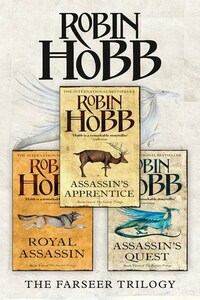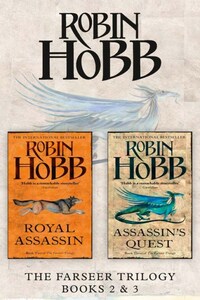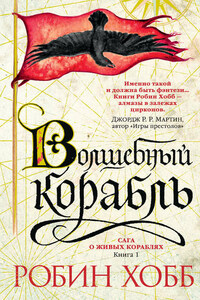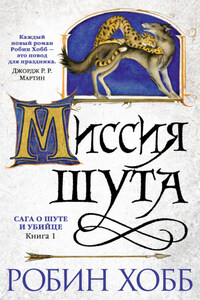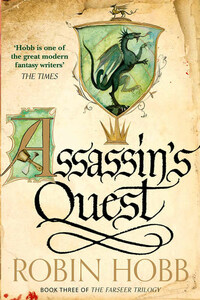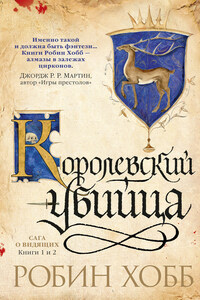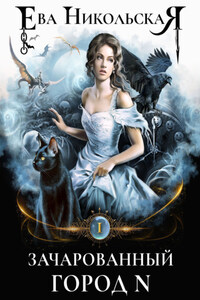HarperVoyager An imprint of HarperCollinsPublishers Ltd. 1 London Bridge Street London SE1 9GF
www.harpercollins.com
Assassin’s Apprentice Copyright © Robin Hobb 1995
Royal Assassin Copyright © Robin Hobb 1996
Assassin’s Quest Copyright © Robin Hobb 1997
Cover layout design © HarperCollinsPublishers Ltd
Robin Hobb asserts the moral right to be identified as the author of this work
All rights reserved under International and Pan-American Copyright Conventions. By payment of the required fees, you have been granted the nonexclusive, nontransferable right to access and read the text of this ebook on-screen. No part of this text may be reproduced, transmitted, downloaded, decompiled, reverse engineered, or stored in or introduced into any information storage and retrieval system, in any form or by any means, whether electronic or mechanical, now known or hereinafter invented, without the express written permission of HarperCollins ebooks
HarperCollinsPublishers has made every reasonable effort to ensure that any picture content and written content in this ebook has been included or removed in accordance with the contractual and technological constraints in operation at the time of publication
Ebook Edition © JUNE 2013 ISBN: 9780007531486
Version: 2017-11-01
A history of the Six Duchies is of necessity a history of its ruling family, the Farseers. A complete telling would reach back beyond the founding of the First Duchy, and if such names were remembered, would tell us of Outislanders raiding from the Sea, visiting as pirates a shore more temperate and gentler than the icy beaches of the Out Islands. But we do not know the names of these earliest forebears.
And of the first real king, little more than his name and some extravagant legends remain. Taker his name was, quite simply, and perhaps with that naming began the tradition that daughters and sons of his lineage would be given names that would shape their lives and beings. Folk beliefs claim that such names were sealed to the newborn babes by magic, and that these royal offspring were incapable of betraying the virtues whose names they bore. Passed through fire and plunged through salt water and offered to the winds of the air; thus were names sealed to these chosen children. So we are told. A pretty fancy, and perhaps once there was such a ritual, but history shows us this was not always sufficient to bind a child to the virtue that named it …
My pen falters, then falls from my knuckly grip, leaving a worm’s trail of ink across Fedwren’s paper. I have spoiled another leaf of the fine stuff, in what I suspect is a futile endeavour. I wonder if I can write this history, or if on every page there will be some sneaking show of a bitterness I thought long dead. I think myself cured of all spite, but when I touch pen to paper, the hurt of a boy bleeds out with the sea-spawned ink, until I suspect each carefully formed black letter scabs over some ancient scarlet wound.
Both Fedwren and Patience were so filled with enthusiasm whenever a written account of the history of the Six Duchies was discussed that I persuaded myself the writing of it was a worthwhile effort. I convinced myself that the exercise would turn my thoughts aside from my pain and help the time to pass. But each historical event I consider only awakens my own personal shades of loneliness and loss. I fear I will have to set this work aside entirely, or else give in to reconsidering all that has shaped what I have become. And so I begin again, and again, but always find that I am writing of my own beginnings rather than the beginnings of this land. I do not even know to whom I try to explain myself. My life has been a web of secrets, secrets that even now are unsafe to share. Shall I set them all down on fine paper, only to create from them flame and ash? Perhaps.
My memories reach back to when I was six years old. Before that, there is nothing, only a blank gulf no exercise of my mind has ever been able to pierce. Prior to that day at Moonseye, there is nothing. But on that day they suddenly begin, with a brightness and detail that overwhelms me. Sometimes it seems too complete, and I wonder if it is truly mine. Am I recalling it from my own mind, or from dozens of retellings by legions of kitchen maids and ranks of scullions and herds of stable-boys as they explained my presence to each other? Perhaps I have heard the story so many times, from so many sources, that I now recall it as an actual memory of my own. Is the detail the result of a six-year-old’s open absorption of all that goes on around him? Or could the completeness of the memory be the bright overlay of the Skill, and the later drugs a man takes to control his addiction to it, the drugs that bring on pains and cravings of their own? The last is most possible. Perhaps it is even probable. One hopes it is not the case.
